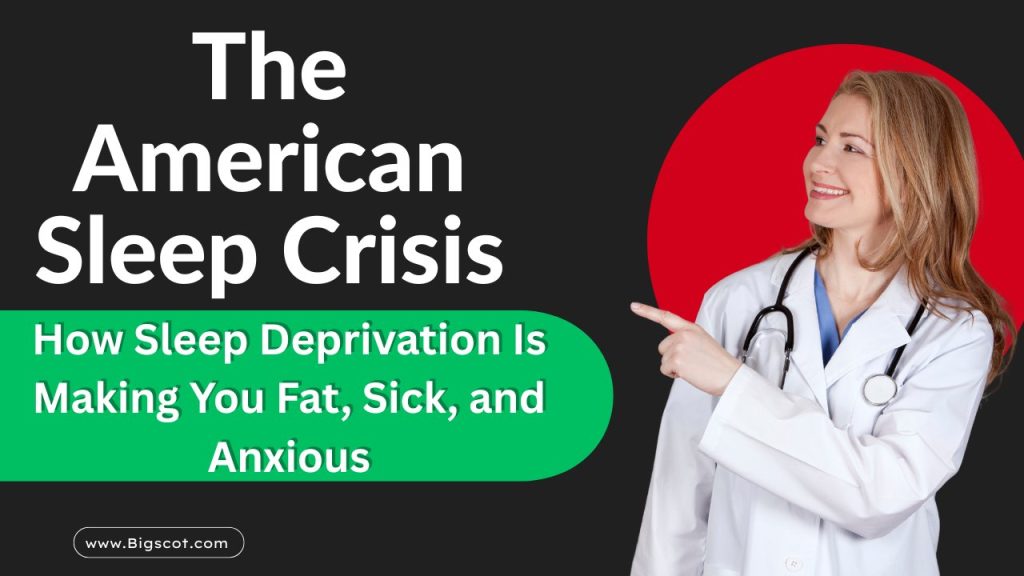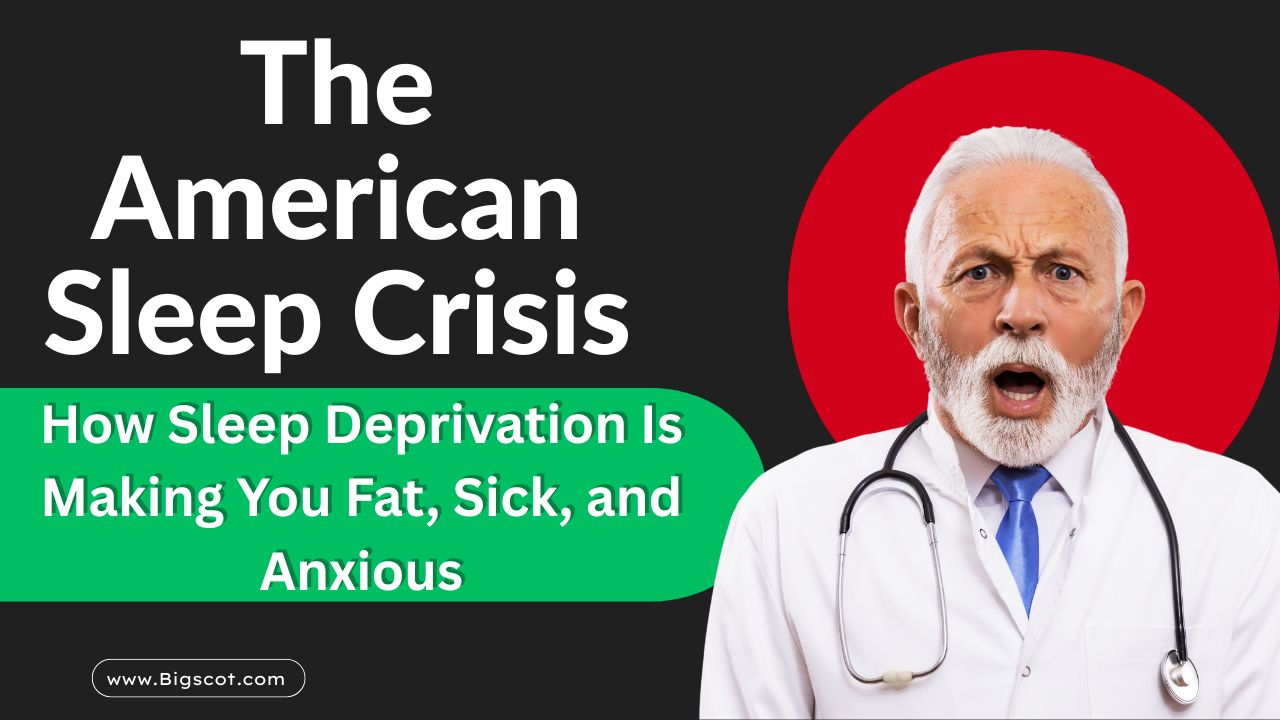Sleep: The Silent Superpower Your Body Can’t Live Without
Sleep isn’t just a time-out—it’s your body’s command center for healing, hormone regulation, and cellular repair. Every night you miss quality sleep, you’re not just feeling groggy the next day—you’re accelerating aging, piling on stubborn fat, weakening your immune system, and flooding your brain with toxic waste that was never cleared. Chronic sleep loss doesn’t scream—it whispers, sabotaging your mood, metabolism, and mental clarity over time. If you’re waking up tired, gaining weight without reason, or emotionally off-balance, the root cause may not be diet or stress… it might be the sleep you’ve been sacrificing in silence.
Introduction:
Sleep deprivation is the silent epidemic of modern America. From late-night scrolling to 24/7 hustle culture, millions are unknowingly wrecking their metabolism, hormones, and mental clarity. If you’ve tried every diet and still feel bloated, anxious, or exhausted — your sleep debt may be the real culprit.
In this post, we’ll uncover the hidden science behind how poor sleep drives weight gain, inflammation, mood swings, and even chronic diseases. And most importantly — we’ll show you how to fix it naturally.
The Data: America’s Alarming Sleep Statistics
| Metric | Fact |
|---|---|
| % of Americans getting less than 7 hours/night | 35% |
| Adults reporting daytime sleepiness at least 3 times/week | 50%+ |
| Increased risk of obesity with under 6 hours of sleep | 55% higher |
| Risk of depression with chronic sleep loss | 4x more likely |
Source: CDC, NIH, Sleep Foundation
1. Lack of Sleep = Hormonal Chaos
When you lose sleep, your body loses balance. Here’s what happens biologically:
- Cortisol skyrockets: Your stress hormone rises, promoting fat storage, especially in your belly.
- Ghrelin increases: This is your hunger hormone — making you crave sugary and salty junk.
- Leptin drops: This satiety hormone plummets, so you don’t know when to stop eating.
- Insulin sensitivity declines: Blood sugar spikes more easily, which leads to fat gain and pre-diabetes.
Even ONE bad night of sleep can disrupt your hormones and metabolism for up to 48 hours.
2. Sleep and Weight Gain: The Missing Link in Most Diets
You can be in a calorie deficit and still not lose weight if your sleep is broken. Here’s why:
- Poor sleep inhibits fat oxidation, making it harder to burn stored fat.
- Your body becomes resistant to fat loss because it’s in stress-survival mode.
- Muscle breakdown increases (catabolism), slowing your metabolism.
Study Highlight: A University of Chicago study showed that dieters who slept only 5.5 hours per night lost 55% less fat and 60% more muscle compared to those who slept 8+ hours.
3. Mental Health: Anxiety, Depression, and Cognitive Drain
- Sleep deprivation reduces GABA, your brain’s natural calming neurotransmitter.
- It increases amygdala activity, making you more emotionally reactive and anxious.
- It shrinks your hippocampus, impacting memory and decision-making.
Chronic insomnia is now being linked to early dementia and long-term brain fog in adults under 40.
4. Inflammation: The Root of All Modern Disease
- Inadequate sleep raises CRP (C-reactive protein), a key marker of systemic inflammation.
- It weakens your gut barrier, triggering leaky gut and autoimmune responses.
- It reduces your immune function by suppressing T-cell production.
Even mild sleep loss (under 6 hours/night) over several weeks can raise your risk of:
- Cardiovascular disease
- Obesity
- Type 2 diabetes
- Depression
- Chronic fatigue syndrome
Table: What Happens at Night While You Sleep
| Sleep Phase | Body Activity | Why It Matters |
|---|---|---|
| NREM (Deep Sleep) | Tissue repair, fat burning, immune reset | Crucial for fat loss and detox |
| REM Sleep | Brain detox, memory formation | Helps regulate mood and anxiety |
| Growth Hormone Surge | Happens during first 90 mins | Vital for muscle repair and metabolic health |
5. The Gut-Sleep Connection: Why You Wake Up Bloated
- Your gut microbiome follows your circadian rhythm.
- Poor sleep disrupts the microbes that control inflammation, digestion, and nutrient absorption.
- It also promotes the overgrowth of bad bacteria that increase belly bloat, gas, and cravings.
The Vicious Loop: Poor Sleep → Stress → Poor Sleep
The American lifestyle traps people in a loop:
- Poor sleep increases stress hormones.
- Stress keeps you awake at night.
- Fatigue leads to caffeine, sugar, and screen time — worsening the cycle.
Solution: How to Fix Your Sleep and Reboot Fat Loss
If you’re serious about losing fat, fixing your sleep isn’t optional—it’s foundational. Deep, restorative sleep regulates the very hormones that control appetite (ghrelin and leptin), fat storage (insulin), and stress (cortisol). The key? Create a sleep sanctuary: cut blue light 90 minutes before bed, eat your last meal 3 hours prior, and cool your room to 65°F (18°C). Add magnesium-rich foods, practice breathwork, and sync your circadian rhythm by getting morning sunlight within 30 minutes of waking. When your body finally enters true rest, it doesn’t just recover—it resets your fat-burning metabolism like a biological switch flipped back to factory settings. Sleep isn’t a break from your fat loss journey—it’s the engine behind it.
Practical Action Steps
| Habit | Why It Works |
|---|---|
| Go to bed before 11PM | Aligns with natural melatonin rhythm |
| No screens 1 hour before sleep | Blue light suppresses melatonin |
| Magnesium glycinate or Epsom salt bath | Relaxes nervous system |
| Keep bedroom under 70°F | Cooler temps promote deeper sleep |
| Eat carbs at night (yes!) | Lowers cortisol and helps melatonin |

Pro-Level Tips:
- Use red light therapy in the evening.
- Consider adaptogens like ashwagandha or reishi mushroom.
- Block out EMFs by turning off Wi-Fi at night.
Final Thoughts:
If you’re stuck in a cycle of weight gain, anxiety, or inflammation — don’t start another restrictive diet or expensive supplement stack. Fix your sleep first. It’s free, it’s powerful, and it’s the foundation your body needs to heal itself.
Sleep is not the opposite of productivity — it’s the root of it.
Struggling with weight gain and fatigue? Discover how sleep deprivation might be sabotaging your health and metabolism.

